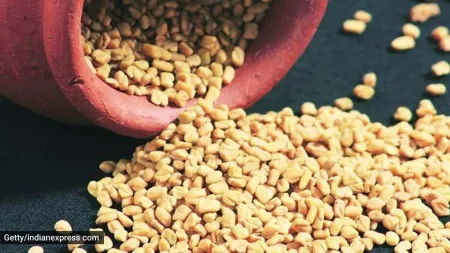What is the ‘HMF rule’ that may help relieve constipation?
Owing to our erratic and unhealthy eating schedules, Digestive disorders like constipation have become commonplace. But, if you experience the same on a regular, you may want to find out the root cause of the issue to tackle it on time and properly. As such, if you are struggling with constipation, nutritionist Pooja Makhija has a solution — the HMF rule — which she said can “attack” constipation if “done persistently and consistently every day. It’s a cycle to set straight”.
But before understanding what is HMF and how it works, let’s find out what causes constipation.

Constipation is a common gastrointestinal disorder characterised by infrequent bowel movements, difficulty passing stools, or the sensation of incomplete evacuation. Gastroenterologists, who specialise in the diagnosis and treatment of digestive system disorders, play a crucial role in managing constipation, particularly when it becomes chronic or refractory to initial interventions.
Dr Pratik Tibdewal, consultant gastroenterologist, Wockhardt Hospitals Mira Road elucidated that constipation management typically begins with a thorough medical history review and physical examination to identify potential underlying causes and contributing factors. “This process involves assessing dietary habits, fluid intake, physical activity levels, medication use, and any relevant medical conditions or surgeries,” said Dr Tibdewal.
For patients with chronic or severe constipation who do not respond to conventional treatments, further diagnostic evaluation may be necessary. Gastroenterologists may perform additional tests such as imaging studies (e.g., abdominal X-rays, defecography) or physiological tests (e.g., anorectal manometry, colonic transit studies) to assess colonic function and identify any anatomical or functional abnormalities, added Dr Tibdewal.
In some cases, gastroenterologists may recommend more invasive procedures, such as colonoscopy, to evaluate the colon for structural abnormalities, inflammation, or colorectal cancer. However, colonoscopy is typically reserved for cases where there are additional symptoms or risk factors suggestive of underlying pathology.
Another lifestyle modification to tackle contipation, according to Makhija is the HMF:
H for Hydration
Remember caffeine is anti-water. “So replace each of tea/coffee with two added cups of water,” said Makhija.
M for Movement
This doesn’t have to be active aggressive cardio like Zumba and aerobics. “Even simple walks can do magic. But [doing it ] daily is key,” Makhija said.
F for Fibre
A glass of vegetable juice is a great way to increase the roughage bulk to increase stool peristalsis.
Gastroenterologists, too, often emphasise lifestyle modifications as the initial step to manage constipation. “This may include increasing hydration and dietary fibre intake through the consumption of fruits, vegetables, whole grains, and legumes. Fibre helps add bulk to stools and promotes regular bowel movements. Adequate hydration is also essential to maintain bowel function, so patients are encouraged to drink plenty of fluids, especially water,” said Dr Tibdewal.
 Does your diet have enough fibre? (Source: Getty Images/Thinkstock)
Does your diet have enough fibre? (Source: Getty Images/Thinkstock)
In addition to dietary adjustments, gastroenterologists recommend regular physical activity, as exercise can stimulate bowel motility and improve overall gastrointestinal health. “Establishing a consistent bowel routine, such as attempting to have a bowel movement at the same time each day, may also be beneficial for some individuals,” said Dr Tibdewal.
If lifestyle modifications alone are insufficient to alleviate constipation symptoms, gastroenterologists may prescribe medications to help facilitate bowel movements. “These medications include laxatives, stool softeners, osmotic agents, and prokinetic agents, each of which works through different mechanisms to relieve constipation,” said Dr Tibdewal.
View this post on Instagram
A post shared by Pooja Makhija (@poojamakhija)
Overall, the management of constipation by gastroenterologists involves a comprehensive and individualised approach tailored to each patient’s specific needs and underlying factors. “This may include a combination of dietary and lifestyle modifications, pharmacological interventions, and, if necessary, further diagnostic evaluation to ensure optimal outcomes and symptom relief,” said Dr Tibdewal.
Disclaimer: The copyright of this article belongs to the original author. Reposting this article is solely for the purpose of information dissemination and does not constitute any investment advice. If there is any infringement, please contact us immediately. We will make corrections or deletions as necessary. Thank you.





